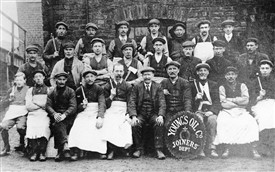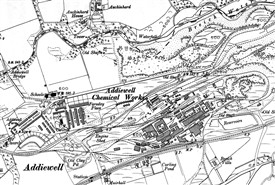Addiewell Oil Works to close

The number of joiners employed at Young's Oil Works in Addiewell in the 1900s gives some indication of the huge size of the works - and the workforce at that time.
John Kelly. All rights reserved. S1. 83.

Addiewell village and oil works in 1922
Ordnance Survey, 1922 edition.
The Courier announces many shale industry closures in 1956
Addiewell and Bathgate Works to close, and Burngrange Pit
Some 500 workers will be affected by the decision of Scottish Oils, Ltd., a subsidiary of the British Petroleum Co., to close down their establishments at Addiewell Works, West Calder; Bathgate Acid Works, and Burngrange Pit.
In a statement on Monday night, the firm explained they have decided to take the steps to restrict further the production of shale oil following a Government decision that further protection to the industry through an increase in the existing duty preference on motor spirit and diesel oil would not be justified.
The statement continued: “About five months ago it was decided to close down Roman Camp Works and its supplying mines. This has already been given effect to and steps will now be taken in the near future to shut down Addiewell Works, Bathgate Acid Works, and Burngrange Pit.
“The number of employees at present engaged in these activities is some 500. Unfortunately it will not be possible, as in the case of Roman Camp, to find work for all these men either at Grangemouth or other parts of the shale oil industry.”
210 men employed at Addiewell Works
An official of the firm said on Monday night that there were about 210 men employed at Addiewell Works, 260 at Burngrange Pit and 23 at the Bathgate Acid Works. There was also an administrative staff of 13 for Addiewell Works and Burngrange.
Although some further cutting down of activities by Scottish Oils was expected, nothing was known until Monday in official circles about the timing of the next move. Monday night’s announcement therefore came as a surprise to many of those concerned with meeting the new situation.
“The shale oil industry in West Lothian has suffered increasingly from the competition of other oils over the past 40 years,” said a spokesman. “Its main product has been allowed to pay less duty than the imported products since 1928, and benefitted in October 1953 when the preference on indigenous oils was increased from 9d to 1s 3d a gallon. The duty on imported oil is 2s 6d a gallon, and the duty on home produced oil is 1s 3d.
No more help from government
“Production costs have, however, increased, and a request from Scottish Oils, Ltd., for a further increase in preference was given a thorough consideration by the Government. In March this year, however, the company were informed by the Ministry of Fuel and Power that the Minister had decided that increased assistance from Government funds would not be justified.
“The need for alternative employment in this area is already recognised, and representatives of the departments concerned have attended a conference called by the County Council to consider the attraction of new industries to the area.”
West Lothian Courier , 20 April 1956, page 9.